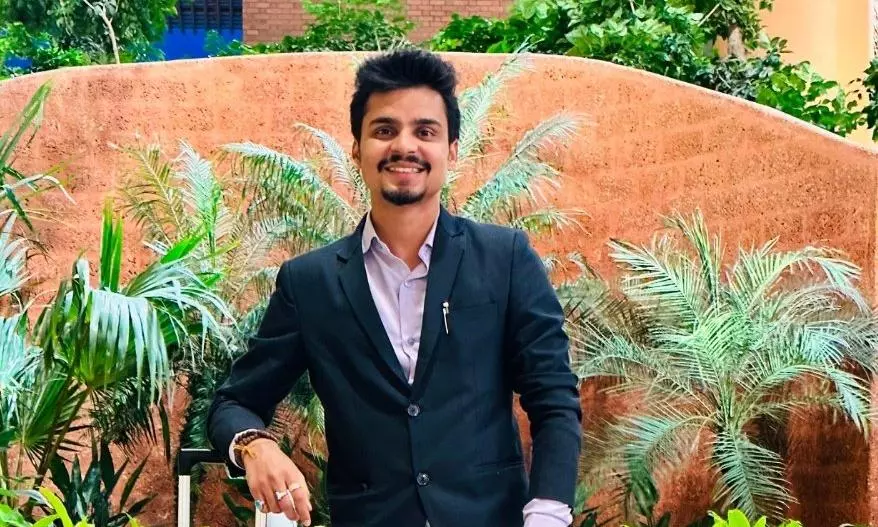
Who is Ravisutanjani Kumar? Why is he in the news?
A right-wing social media fintech influencer followed by the PM and other leaders, he allegedly faked his degrees and qualifications

Financial influencers can make or break fortunes. They guide their followers on social media on how best they can make investments and minimise tax, and even help pick stocks. Amid the growing concern on the trend - for several of such fintech influencers are poorly qualified but have millions of followers who take their word for gospel truth - Twitter has been shocked by the sudden 'disappearance of Ravisutanjani.
Ravisutanjani, the man who made waves on social media with a cardless cash withdrawal from India’s inaugural UPI-ATM at the recent Global Fintech Fest in Mumbai, is not to be seen. His case is getting curiouser and curiouser.
Kumar was seen posing with Union Commerce Minister Piyush Goyal for a photograph at an event that has since been shared by several Twitter users. In fact, Goyal expressed his enthusiasm on Twitter on September 7, proclaiming, “UPI ATM: The future of fintech is here”, as he shared a video that has drawn a lot of attention. The video featured Kumar, who demonstrates how he successfully withdrew Rs 500 using the UPI (Unified Payments Interface). He referred to this feature as an “innovative addition for Bharat”. The video on Kumar’s account garnered over 2.2 million views. The UPI-ATM is a white-label ATM designed to facilitate cardless cash withdrawals.
Ravisutanjani Kumar poses with Union Minister Piyush Goyal at an event. | Photo credit: Twitter
The fintech influencer got a pat on the back from none less than the Prime Minister.
'Fake degrees'
On Wednesday, Kumar reportedly deleted his Twitter and LinkedIn accounts after Twitter handle @SatarkAadmi posted a thread with the tagline “Who is the real Ravisutanjani? And why is he faking it?” which “unmasked” his fake degrees. “Followed by Prime Minister Narendra Modi, Kumar allegedly used to charge Rs 30,000 per day for digital consultation and training. He faked his degrees and qualifications, having just 1 degree, he claimed 10 including IIT and MBA,” tweeted @SatarkAadmi. Kumar also allegedly offered paid consultancy services ranging from Rs 2,500 to Rs 25,000 per session.
“Studied Computer Engineering from IIIT Allahabad. Really? IIIT Allahabad offers BTech only in ECE and IT branches. Also, your name does not feature in any of the convocations held between 2015 and 2022. Attended PGP in business management and marketing at MDI Gurgaon. You sure? MDI Alumni who attended similar courses between 2016 and 2021 denied that you were not there in any of those batches. Also tell us more about HEC Paris,” it added in a thread of Twitter posts.
@SatarkAadmi found that Kumar was not a computer engineering graduate from IIIT Allahabad but actually did a course of “Wireman” at government ITI in Mirzapur. @SatarkAadmi also revealed several other fake degrees and positions that Kumar claimed he held. Initially, Ravisutanjani, who claimed to be a top startup voice, tried to defend himself in a detailed post on Twitter, but later deleted his account.
Accounts deleted
“Ravisutanjani deleted his Twitter & LinkedIn. It wasn’t a case of someone with skills but no degrees. He was an alleged fraud at the workplace too. Got fired within months, not because of fake degrees, but because he could do no valuable work,” posted entrepreneur Abhishek Asthana, founder of digital advertising startup Ginger Monkey and known as @GabbarSingh on Twitter.
When he was on Twitter, Kumar repeated criticised the reservation policy, saying it held the nation back from progress. However, he himself is said to have used a Scheduled Caste certificate for education.
“Whatever Ravi did was absolutely wrong. He shouldn't have faked it in the first place, but we as a community should remember not to exceed & cross the line! He got a reality check and we all got to know the truth; we shouldn't stretch it to a breaking point,” posted author and community enabler Siddharth Roy.
This entire episode has raised questions about the credibility of finance influencers on social media platforms amid their growing regulatory scrutiny. Market watchdog SEBI is already finalising a draft discussion paper to formulate rules and guidelines to regulate the mushrooming number of unregistered financial influencers or finfluencers who offer investment advice to the public.

